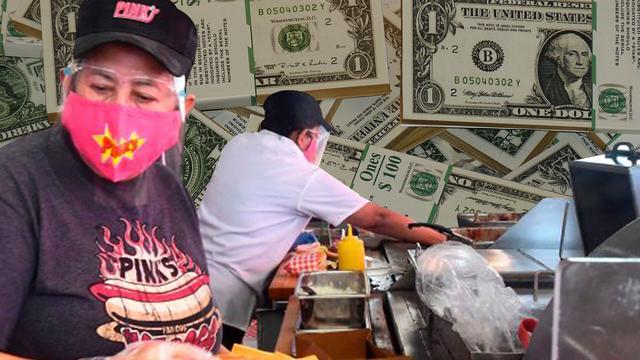Garment manufacturers for Forever 21 and Ross paid their employees $4 an hour
LOS ANGELES TIMES —
It's hard to ignore the allure of Forever 21, where fall jackets are $18 and an evening gown can be as low as $9.
But investigators from the US Department of Labor say such deals are too expensive for people like Pedro Montiel, who earns $4.50 an hour putting labels and other finishing touches on blouses at one of the retailer's suppliers.
Montiel does not work in a Mexican factory, nor in China; he does it in a company located in the basement of a building in downtown Los Angeles. “You can't buy anything you need. Between rent and food, everything is gone; there's no money left,” said Montiel, who lives with two roommates in Boyle Heights.
Forever 21 is one of several companies selling products from several independent Southern California factories that pay workers far less than the state minimum wage, the Labor Department announced Wednesday.
Department sources said that between April and July, 77 local apparel companies that manufacture for some of the country's largest clothing stores were investigated.
Investigators uncovered labor violations in 85% of cases, the department said, and found that companies cheated workers out of $1.1 million. Retailers linked to these companies include Ross Dress for Less, Forever 21, and TJ Maxx. Some workers were paid as little as $4 an hour, and others earned $7 an hour on average — $3 less than the state minimum wage.
Rubén Rosalez, regional administrator of the Department of Labor.
The department penalized garment companies and some manufacturers that act as intermediaries between factories and retailers. The companies were ordered to pay $1.3 million in lost wages and damages to workers. But retailers will not face repercussions for hiring factories that violate labor laws.

The Department of Labor can only penalize companies that directly employ workers. Retailers are keeping their distance from factories by working with multiple layers of suppliers, government lawyers and labor advocates said. “This business model has protected them from any legal liability,” said Rubén Rosalez, a regional administrator for the Department of Labor. The problem, he said, is that retailers haven't raised the fees they pay manufacturers in years. “Retailers set the prices. They say: 'Let's make this shirt for this money', but it is the workers at the end of the chain who are harmed”.
National department stores such as Macy's and Nordstrom have ties to garment makers that also weren't paying minimum wage, the department said. But the company that comes up most often in the investigation is Ross Dress for Less, a Dublin, Calif., retailer with a strong presence in the region's malls.
How to Analyze Political Cartoons: 6 Steps (with Pictures) USE FOR SYNTHESIS ESSAY https://t.co/RTpkERD8Se
— Mary Johnson Wed Jan 27 14:28:34 +0000 2016
Labor Department officials said they met with executives from Ross and Forever 21, asking them to step up monitoring and pay their contractors more so they can pay better wages.
Connie Wong, a spokeswoman for Ross, said in an email that the company is working with the Department of Labor to make sure suppliers understand the law. “Ross stores take labor issues very seriously; we require our suppliers to meet our ethical standards,” said Wong.
Also via email, a Forever 21 spokeswoman confirmed that the company has met with the Department of Labor and that she is cooperating with the agency. “Forever 21 takes these issues very seriously and requires all of its providers to comply with the law,” she said.
For their part, the representatives of TJ Maxx did not return requests for comments by this medium.
It's unclear whether retailers will continue to do business with garment makers that paid workers less. Rosalez said retailers hire monitors to make sure their foreign suppliers follow the law, but they don't do the same level of inspection in the US.
This has fueled more wage abuse in Southern California over the past decade, as retailers try to keep their prices flat as the minimum wage rises across the state, Rosalez said. “Stores want to meet demand quickly. It's cheaper to do it here, as long as no one investigates."
Jose Garcia, 35, said he spends about 55 hours each week hemming women's blouses, dresses and pants for a factory that supplies Ross. For each blouse he sews, Garcia earns about 22 cents, he said. At the end of each week, he leaves his sewing machine on the third floor of a run-down building in downtown LA and gets a check for about $320. That means the worker earns about $6 per hour, after subtracting 30 minutes a day for lunch.
“It seems unfair,” said Garcia, who immigrated to California from Puebla, Mexico, in 2000. “They say the minimum will be $15 an hour, but we still make $6 or $7… Stores don't want to pay more for clothes.”
Garcia spends about $1,060 each month on basic necessities like rent, food, car insurance and fuel for his 2002 Ford Explorer. That leaves $200 each month for other expenses. "If you want to go out to eat, or to the movies, or send money to your family, you have nothing left," he assured.
If you want to read the note in English, click here.
Translation: Valeria Agis
